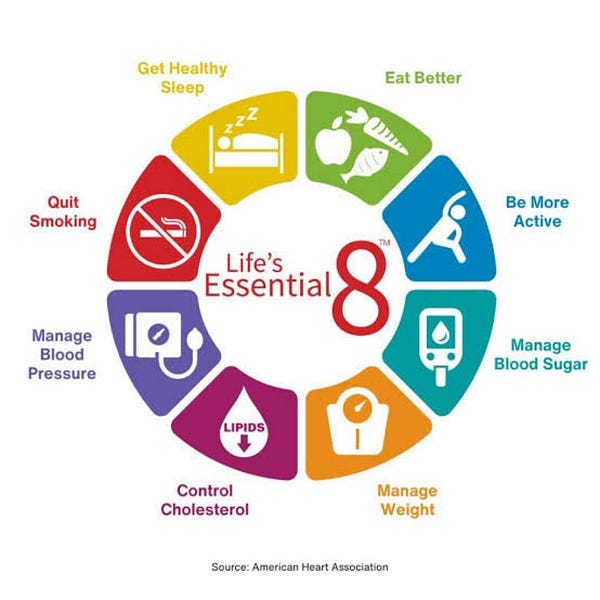Beyond Prescriptions: Why Life's Essential 8 Matters for Your Health
A Doctor's guide to heart health for every age

What Is Life’s Essential 8, and When Was It Commissioned?
Life’s Essential 8 is a science-based framework developed by the American Heart Association (AHA) to promote optimal cardiovascular health. It was introduced in 2022 as an update to the previous Life’s Simple 7 model, incorporating new research on lifestyle and health behaviors that contribute to heart health. The framework focuses on eight key areas shown in the image below
1. Healthy diet
2. Physical activity
3. Nicotine exposure
4. Sleep health
5. Weight management
6. Blood lipid levels
7. Blood glucose levels
8. Blood pressure control
These factors collectively determine cardiovascular health and longevity, influencing not just heart disease risk but overall well-being.
Are Doctors Speaking Enough About Life’s Essential 8?
Despite the well-established benefits of preventive care, many healthcare providers focus more on treating illnesses than on discussing preventive strategies like Life’s Essential 8. Research indicates that while doctors acknowledge the importance of lifestyle modifications, time constraints, lack of patient interest, and systemic barriers often prevent comprehensive discussions. A study published in Circulation (2023) found that fewer than 30% of patients reported receiving guidance on all aspects of cardiovascular health during routine checkups.
Furthermore, a survey by the AHA revealed that while doctors frequently discuss smoking cessation and blood pressure management, topics like sleep health, diet, and physical activity receive less attention. Integrating lifestyle counseling into primary care settings could improve adherence to heart-healthy behaviors, ultimately reducing the burden of cardiovascular disease.
Here are some practical ways to incorporate life’s most essential 8 into our daily lives:
Tips for Children
Promoting heart health in childhood lays the foundation for lifelong wellness. Key recommendations include:
• Nutrition: Encourage a diet rich in fruits, vegetables, whole grains, and healthy fats while limiting processed foods and sugary beverages.
• Physical Activity: Ensure at least 60 minutes of structured play or physical activity daily.
• Screen Time: Limit sedentary screen time to encourage movement and social interaction.
• Sleep: Establish consistent sleep routines, aiming for 9 — 12 hours per night for younger children and 8 — 10 hours for teens.
• Avoiding Nicotine: Educate children early about the dangers of smoking and vaping.
• Routine Checkups: Regular pediatric visits can monitor blood pressure, weight, and other risk factors.
Tips for Adults
For adults, balancing work, family, and health can be challenging. Practical ways to integrate Life’s Essential 8 include:
• Diet: Adopt a Mediterranean-style diet rich in healthy fats, fiber, and lean proteins.
• Exercise: Incorporate movement throughout the day — walking meetings, standing desks, and regular workouts.
• Stress Management: Practice mindfulness, yoga, or deep breathing exercises to reduce stress.
• Sleep Hygiene: Avoid screens before bedtime, maintain a dark sleep environment, and aim for 7 — 9 hours of sleep.
• Health Monitoring: Keep up with routine blood pressure, cholesterol, and glucose screenings.
Tips for Those with Cardiometabolic and Chronic Conditions
Individuals with conditions such as hypertension, diabetes, and metabolic syndrome require tailored lifestyle interventions:
• Personalized Nutrition: Work with a dietitian to create meal plans that support glucose control, blood pressure, and cholesterol management.
• Medication Adherence: Ensure consistency with prescribed medications while integrating lifestyle changes.
• Low-Impact Exercise: Engage in joint-friendly activities like swimming, cycling, or walking.
• Monitoring Metrics: Regularly track blood sugar, blood pressure, and cholesterol levels to detect early changes.
Tips for the Elderly
Aging presents unique challenges to maintaining heart health, but small lifestyle adjustments can make a big difference:
• Balanced Diet: Focus on nutrient-dense foods that support muscle health and cognitive function.
• Gentle Exercise: Activities like tai chi, water aerobics, and resistance training help maintain strength and mobility.
• Fall Prevention: Ensure a safe home environment to reduce fall risks.
• Quality Sleep: Address sleep apnea and other disorders that affect rest.
• Social Connections: Stay engaged with family, friends, or community groups to promote mental and emotional well-being.
Conclusion
Life’s Essential 8 provides a holistic approach to cardiovascular health, yet many doctors may not emphasize it enough during routine visits. Whether you’re a child, adult, or older adult — or managing a chronic condition — these evidence-based tips can help you take charge of your heart health. The next time you visit your doctor, consider asking about Life’s Essential 8 to ensure you’re on the right track to long-term well-being.
Stay hale and hearty, Dr Nguper




